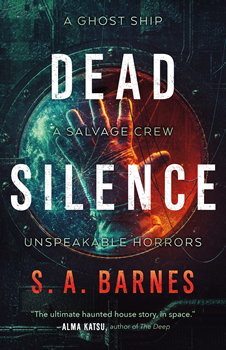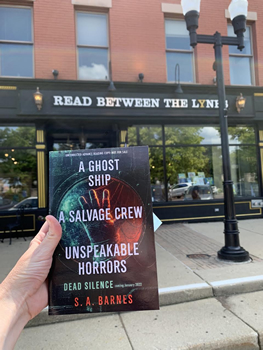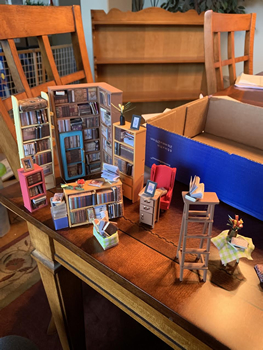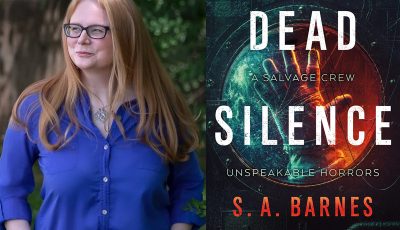

Up Close: S.A. Barnes
Exploring the Stuff of Nightmares
“I did not set out to write horror,” says author S.A. Barnes on the creation of her debut adult horror novel DEAD SILENCE. This will be news to anyone who reads Barnes’s tale of a lost luxury space liner and the would-be salvage crew who are unlucky enough to find it, adrift beyond the reaches of charted space and broadcasting a distress signal on a channel that hasn’t been used in years. If you’re already suspicious of closets, dark hallways, or that gaping maw of nightmares that is the space under your bed, DEAD SILENCE won’t improve your outlook.
What it will do, though, is make you care deeply about its characters and keep you reading well into the night. DEAD SILENCE centers on Claire Kovalik, captain of a small maintenance ship that’s about to be decommissioned. Claire and her crew are on their last deployment, which means Claire will soon be grounded by her employer and confined to a desk job in a crowded office complex—an untenable fate for a pilot who craves the silence and isolation of deep space because… well, let’s just say she has reasons.
So when they stumble upon the Aurora, a first-of-its-kind luxury space cruiser that disappeared six months into its maiden voyage 20 years earlier, Claire sees a golden opportunity. Thanks to the quirks of maritime salvage law, Claire and her crew stand to reap a life-changing fortune if they can prove their claim to the ship. All they have to do is board the Aurora, secure evidence they were there, and make it back to charted space. Exactly what they find once they board the ship is best left discovered as the story unfolds, but suffice it to say that death did not come gently for the 650 souls aboard the Aurora.
In her first-ever interview with The Big Thrill, Barnes—who also writes YA novels and romance as Stacey Kade—talks about the unexpected inspiration for her main character, finding comfort in a horror story, and why she won’t be taking up birdwatching anytime soon.
Can you pinpoint a moment or incident that sparked the idea for DEAD SILENCE?
I don’t think I can trace it to a single moment. It’s more a conglomeration of a bunch of my obsessions: ghosts, shipwrecks, ghost ships, and living and working in space. The ghost ship/shipwreck thing has been with me for years. I’m fascinated by anything that gives us a moment frozen in time. The bread still in the baker’s oven in Pompeii. The ghost ships found with meals still laid out on the table but no one on board. The bathtub still visible in the captain’s quarters in the Titanic wreckage (though it’s not anymore, due to the continued decay/disintegration).
I am not adventurous in real life! But the idea of being able to explore one of those frozen moments holds great fascination for me. Honestly, when I was still working out the details of what this story would be, before I even truly knew who Claire was, I could envision exploring the rooms and hallways of this beautiful, abandoned vessel in space. That was what drove me to figure out the rest.
A novel is a major undertaking—there’s the writing of it, of course, then you’re spending months and months revising, polishing, and then promoting it. How did you know this was the story you wanted to spend the next couple of years on?
I’m not sure I ever feel certain about any story, but some ideas are, for lack of a better description, more persistent than others. This story just wouldn’t leave me. I struggled with the opening scenes for this book for months. But every time I got frustrated and thought, “That’s it, forget it,” I’d feel this little tug back to it, an internal whisper that I needed to try again, that maybe this other scene would work.
I kept trying new openings, new ways into the world and the story, because I really wanted to write it. And I think that’s what it comes down to. For me, writing is like a heightened version of reading, and I really wanted to “read” this book.
Tell me a little about how Claire took shape for you.
Claire, to some extent, was born of my own frustrations. At the time, I was struggling with writing. I’d been publishing as a YA author for years, but then the market shifted away from the stories I liked to write, which is perfectly normal and necessary in the evolution of a genre/audience. But I couldn’t see that at the time. I kept trying to bend and twist myself to fit what was selling and…it was not going well. Just rejection after rejection.
Suddenly I was confronted with the idea that what I loved to do might be over. And, in that moment, I felt so helpless and out of control. Claire, facing the prospect of losing her work and role on the LINA [the ship she commands], of being forced to return to Earth, held parallels of that for me.
The worldbuilding is spectacular—your version of 2149 is such a fully imagined future, full of details that ground it in a world that’s both recognizable and thoroughly changed. How did you go about constructing that future?
I didn’t want to go too far into the future. I suffer a severe lack of imagination when it comes to trying to predict what life will be like in 300 years. So I wanted our current world to be the leaping-off point both in terms of social issues (the growing divide between the exceptionally wealthy and those who are struggling, corporations taking over in space exploration, etc.) and the technology (paper being reserved for the upper crust and/or special occasions). All of those things are emerging trends right now, and I just pushed them a little further.
I also will say that the further you go, in terms of distance from our current world, the more explaining you, as the author, have to do about this new, strange version of the world. And as a reader, I hate encountering six paragraphs about this super fancy device/tech and how it works. So I was aiming to have as little of that as possible.
I gather that the story of the Titanic played a formative role in DEAD SILENCE. Can you elaborate on that, without giving away any of your book’s surprises?
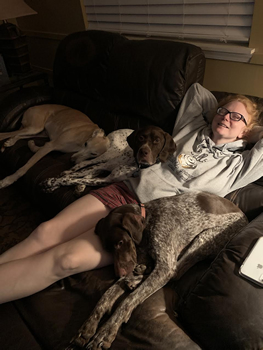
For Barnes, lockdown meant lots of quality time with her three dogs (left to right): Shutter, Wyatt, and Calla.
Oh, sure. I’ve been obsessed with the Titanic since I was a kid. I’m old enough to remember when Robert Ballard discovered the wreck and the first pictures came back from the sea floor. But mainly, I think it’s that combination of just absolute luxury and human arrogance that called to me. This idea that we would ever call a ship “unsinkable.” I mean, come on.
The divide between the first- and third-class passengers’ experiences also haunted me. Most of the deaths were among the third-class passengers and the crew. Though it seems that they were not locked below decks, as has been speculated and depicted in various films, that idea was especially horrific. And, without revealing too much, elements of that were an influence in the creation of the Aurora, the luxury space-liner that Claire and her crew find.
Sometimes sci-fi horror is simply a horror story dropped into a sci-fi setting, but DEAD SILENCE is science fiction in the truest sense of the term—supernatural elements aside, science and technology are integral to the story. How concerned were you with getting the science right?
I’ve written science fiction before but always set on Earth. Just the thought of creating ships and dealing with the hows and whys of the technology involved was overwhelming, at first. But in this case, it was essential to the story I wanted to tell. I am not a scientist, and I do not have a science background, unfortunately. But I did my best to get the science right, even when I was pushing into territories where it was more hypothetical. I’m being careful here, but most of what is depicted is based on existing tech, just stretched or exaggerated to make up for the next 120 years of advancement. I hope!
You’re best known for YA and romance, but DEAD SILENCE is dark, genuinely frightening, and often gruesome (though I wouldn’t call any of the violence gratuitous). Did you ever surprise yourself as you were writing it?
Ha, I suppose I did! I did not set out to write horror. I thought I was writing a sci-fi thriller (admittedly, a gory one). But it makes sense, looking back on it. Horror was probably my first love in reading—right along with romance—thanks to Stephen King and V.C. Andrews. And I must admit, I had so much fun in conjuring scenes and imagery that I hoped would make hearts skip a beat or two. *insert evil laugh*
That said, I had the worst nightmares during the writing of this book. Zombies chasing me. Hands touching me while I slept. The kind of nightmares where you sit up in bed before you’re even fully awake. So while I was hoping to scare other people, I was certainly scaring myself!
Were there any particular books, movies, or songs that were knocking around in your head while you were writing this one?
Oh, definitely! Event Horizon, I love that movie, and I don’t think you can write about a ghost ship in space without bringing that film to mind.
The opening scene in DEAD SILENCE is a deliberate homage to Aliens, the moment in which Ripley is trying to explain to the Weyland-Yutani corporate folks what happened to her and why they should not send a ship to that colony that has mysteriously gone silent. And they don’t believe her. The injustice of that stuck with me and found its way to the surface in this book.
I’ve read that you’re a pantser. Are there any other organizational tools that you find helpful, without sacrificing that sense of spontaneity and discovery?
I need to have a rough idea of the ending and the middle turning point before I can start writing. I don’t write strictly to structure, but I’ve found that having a guide helps. So I keep an eye on Christopher Vogler’s The Writer’s Journey and Michael Hague’s turning points as I write.
I read a lot of horror, and DEAD SILENCE is easily one the scariest books I’ve read in a while. What scares you?
Thank you! That is the very best compliment!
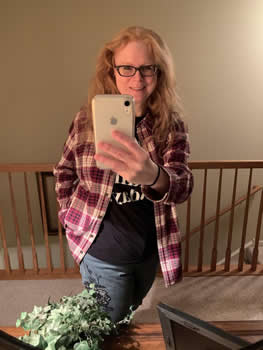
Barnes, who works in a high school library by day, dresses up for “90s Day” during Homecoming week for school/work.
The short answer? Everything. I think one of the reasons I’m drawn to horror is because I relate to it. I have an anxiety disorder, so the feeling of living in fear is something I’m very familiar with.
In horror stories, the relief, to me, is in the main character taking action to try and solve their problem, whether it’s picking up a weapon to confront the supernatural killer chasing them or escaping a haunted house. In real life, of course, anxiety can be pervasive and unending and not so easily solved. (Not that escaping a supernatural killer is easy; movie franchises have taught us that, if nothing else!)
But in short, the most obvious and ridiculous fear I have is my bird phobia. Absolutely terrified of robins, sparrows, etc. If they swoop near my head, you’ll hear me shriek like an ax-wielding maniac has just arrived on my doorstep. It’s an inherited phobia, which means nothing even happened to cause it! My mom is deathly afraid of birds (after a childhood incident involving a headless chicken), and I somehow picked it up as well.
What’s next for you?
That’s a great question. I have a couple ideas I’m working on that I’m excited about. One is science fiction horror, shades of DEAD SILENCE though not a directly related story, that gets into the nitty-gritty of how we define sanity/reality and how confronting our fears of what we’re capable of in our worst moments is sometimes more terrifying than anything else. Plus, you know, lots of mysterious deaths and violence.
The other is more straightforward horror that centers on the cruelty of middle school girls/friendships and how the desperation that drives us to certain decisions can haunt you (figuratively and literally) for years to come. It has a bit of a Yellowjackets vibe, I hope.
- Between the Lines: Rita Mae Brown - March 31, 2023
- Between the Lines: Stephen Graham Jones - January 31, 2023
- Between the Lines: Grady Hendrix - December 30, 2022

